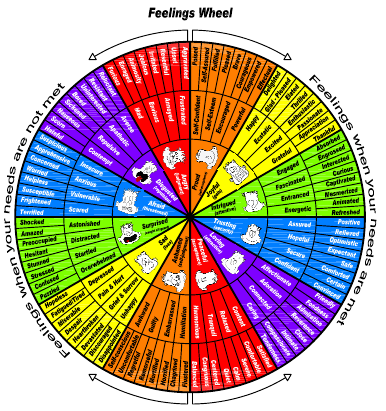The Ten Gifts
We humans all share ten emotional needs, also called the ten gifts.
The need to feel...
- heard
- seen
- accepted
- played with
- taught
- protected
- provided for
- valued
- affection
- that we are enough
Understand your emotions
- Name your emotions, speak their names. Using emotion words, identify what your highest high and lowest low of the day was. If this is difficult, practice with a feelings wheel.
- Choose a safe person (or three) and practice sharing your emotion words with them.
- Let feelings surface as they come, at your own pace. Some people will find this easy, while some people may take years.
Notes
- The goal is to have needs but not be needy. As adults we are free to take responsibility for our emotions in ways we never could as children.
- Not being needy means that we never try to make other people responsible for our feelings.
- A feelings wheel can help put words to emotions.
Feelings wheel
This is a tool depicting emotions around a wheel, they are grouped by category to help put words to your thoughts.
Attribution
The Then Gifts, as a concept, were originally compiled and developed by Laura Duncan. For more information, see also The Compassion Method course, by Laura Duncan.
